by Deep Green Resistance News Service | Mar 13, 2016 | Toxification
Featured image: A huge proportion of the Nahua tribe have been affected by the poisoning, which causes anemia and acute kidney problems © Johan Wildhagen
By Survival International
Up to 80% of a recently-contacted tribe in Peru have been poisoned with mercury, raising serious concerns for the future of the tribe. One child has already died displaying symptoms consistent with mercury poisoning.
The source of the Nahua tribe’s poisoning remains a mystery, but experts suspect Peru’s massive Camisea gas project, which opened up the tribe’s land in the 1980s, may be to blame. The project has recently been expanded further into the Nahua’s territory, prompting fierce opposition from the tribe.
Rampant illegal gold mining in the region is another potential source of the mercury poisoning.
The Nahua, who live inside a reserve for isolated Indians in south-east Peru, have also been suffering from acute respiratory infections and other health problems since they were contacted.
Other indigenous communities in the area may also have been affected by mercury contamination, but tests have not been carried out. Some of these communities are uncontacted or extremely isolated. It is understood that the Peruvian Health and Environment Ministries have been aware of the problem since 2014.
AIDESEP, the main indigenous organization in Peru’s Amazon, is lobbying the government to carry out full health checks on the Nahua and other tribes in the area, and to conduct a proper investigation into the cause of the poisoning. A study was conducted by the Ministry of Health in spring 2015, but the results have yet to be published.
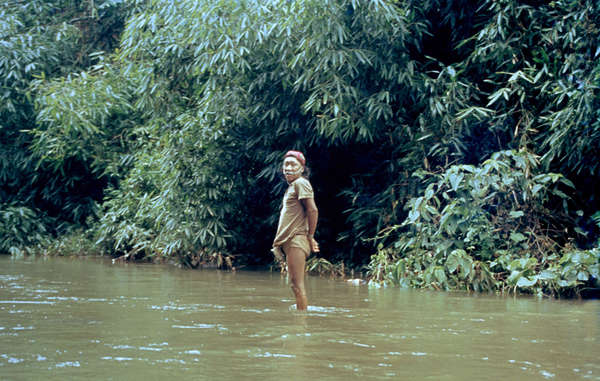
The Nahua were first contacted in the 1980s. Subsequent epidemics killed many members of the tribe
© Survival International
Nery Zapata, an indigenous leader, said: “Mercury contamination is extremely damaging to human health because its effects are irreversible. The health department must investigate this, and stop the contamination that is poisoning the indigenous population.”
Survival has also written to the Peruvian Ministries of Health and Culture urging them to publish the results of their study and put an end to the catastrophe.
Survival’s Director Stephen Corry said: “The Peruvian authorities have always been pretty indifferent to the problems facing their indigenous communities, and the total neglect they’ve shown in this case just proves it. Had this poisoning taken place in Lima, I don’t expect they would have been quite so casual in their response, or as slow to publish the results of their earlier findings. It’s nothing short of scandalous that they are not doing more to sort out this crisis. It’s also very telling that they are withholding information about it from the public.”
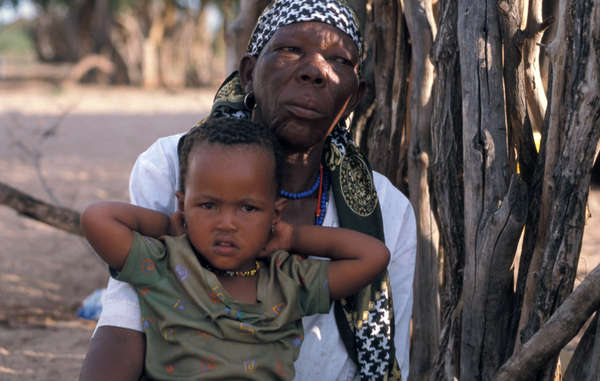
by Deep Green Resistance News Service | Mar 11, 2016 | Colonialism & Conquest
Featured image: Botswana government resettlement camps are poorly supplied, and diseases like HIV/AIDS are rife. © Fiona Watson/Survival International
By Survival International
Survival International has launched a campaign calling for an end to a draconian system in Botswana which has broken Bushmen families apart and denied them access to their land. Critics such as veteran anti-apartheid activist Michael Dingake have compared the system to the apartheid-era pass laws.
The call comes in the fiftieth anniversary year of Botswana’s independence.
After having been brutally evicted and forced into government camps between 1997 and 2002, the Bushmen won a historic court victory in 2006 recognizing their right to live on their land in the Central Kalahari Game Reserve.
Since then, however, this right has only been extended to the small number of Bushmen named in court papers. Their children and close relatives are forced to apply for permits just to visit them, or risk seven years in prison, and children born and brought up in the reserve have to apply for a permit when they turn 18. Many fear that once the current generation has passed away, the Bushmen will be shut out of their land forever.
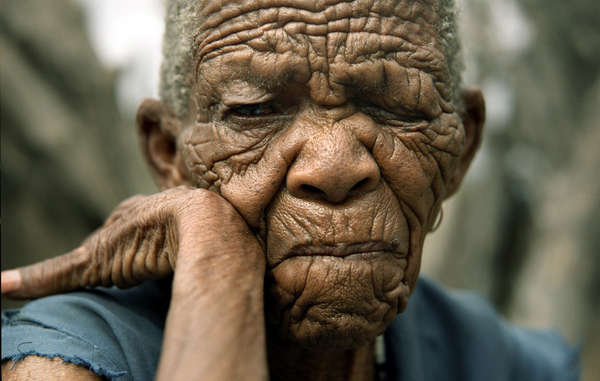
Most Bushmen are still forced to live in government resettlement camps, rather than on their land in the Central Kalahari Game Reserve
© Dominick Tyler
On the subject of the fiftieth anniversary, one Bushman told Survival: “I don’t even know anything about these celebrations. They are doing this so that people will not think they are a bad government. They are celebrating; we are not. We’re still feeling the same way. They’ve been celebrating for the last 49 years.”
Survival’s Director Stephen Corry said: “The Botswana government has viciously persecuted the Bushmen for decades, first with violent evictions and then with a permit system designed to break families apart. If Botswana still wants to be seen as a “shining light” of democracy in Africa, it needs to listen to the Bushmen, uphold its own court’s ruling and end this appallingly unjust restriction on the Bushmen’s right to live on their ancestral land in the Central Kalahari reserve. I hope that this historic year will mark the end of the decades long persecution of the Bushmen.”
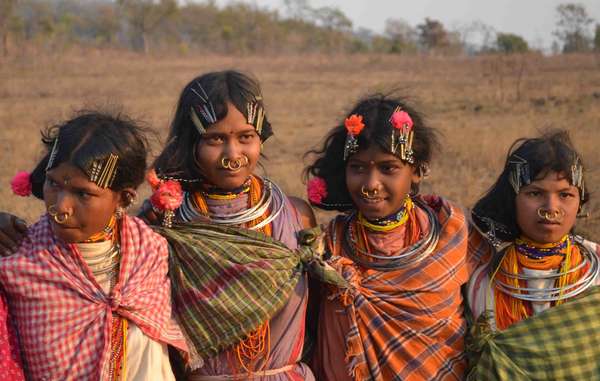
by Deep Green Resistance News Service | Mar 1, 2016 | Indigenous Autonomy, Mining & Drilling
Featured image: The Dongria unanimously rejected the mining project and have vowed to protect the Niyamgiri hills © Bikash Khemka/Survival International
By Survival International
A tribe in eastern India are facing a new threat from mining on their ancestral land, despite having won a major “David & Goliath” legal battle in 2014.
The Dongria Kondh were originally threatened by international mining corporation Vedanta Resources, who tried to open a bauxite mine in their sacred Niyamgiri hills, but were prevented by the Indian Supreme Court, which ruled that the Dongria should decide whether to allow the mine to go ahead.
The tribe unanimously rejected Vedanta’s plans to mine their hills during a historic referendum in which all twelve villages that were consulted voted against the mine.
Now, however, the Odisha state is trying to re-open the issue, petitioning for the right to hold another referendum for the Dongria to pave the way for a large-scale mining operation, this time by state-run Odisha Mining Corporation.
British-owned Vedanta opened a bauxite refinery close to the Dongria’s hills without having secured permission to mine in the area. Even though the mine itself was quashed, the refinery has continued to operate at a loss.
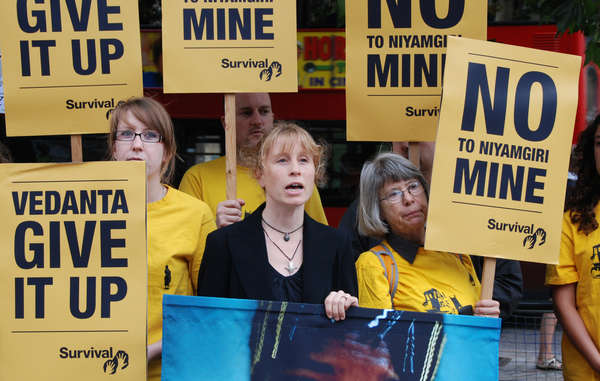
Survival campaigned against Vedanta’s plans and will continue to advocate for the Dongria’s right to protect their sacred hills.
© M. Cowan/Survival International
Despite strong resistance to the project from the Dongria, who have lived in the Niyamgiri hills for generations, the state authorities are keen to keep the refinery open and expand mining operations in the region.
Last year Mukuna Sikaka, a Dongria tribesperson, said: “We are not going to allow mining over Niyamgiri at any cost – not for all the developmental efforts of the government.”
Survival International led a successful global campaign against Vedanta’s plans, and is now calling for the Odisha state authorities to respect the Dongria’s decision to reject the mine.
Survival Director Stephen Corry said: “It is bitterly disappointing to see that the Odisha state authorities have still not learned to respect the wishes of the Dongria Kondh. Tribal peoples have a right under Indian and international law to determine what happens on their lands, yet still governments and corporations insist on putting profits before people’s wishes. Attempts to resume this project after international outcry and stern resistance from the Dongria themselves are not only un-democratic and illegal, but also deeply immoral.”
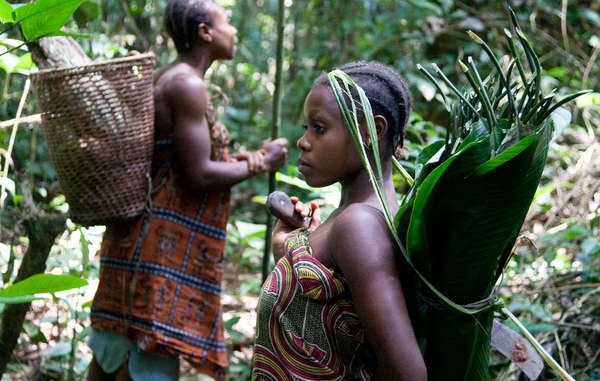
by Deep Green Resistance News Service | Feb 16, 2016 | Lobbying
Featured image: The Baka have lived sustainably in the central African rainforest for generations as hunter-gatherers
© Selcen Kucukustel/Atlas
By Survival International
Survival International has launched a formal complaint about the activities of the World Wide Fund for Nature (WWF) in Cameroon.
This is the first time a conservation organization has been the subject of a complaint to the OECD (Organization for Economic Cooperation and Development), using a procedure more normally invoked against multinational corporations. Survival International has launched a formal complaint about the activities of the World Wide Fund for Nature (WWF) in Cameroon.
The complaint charges WWF with involvement in violent abuse and land theft against Baka “Pygmies” in Cameroon, carried out by anti-poaching squads which it in part funds and equips.
Before beginning its work in Cameroon, WWF failed to consider what impact it would have on the Baka. As a result, WWF has contributed to serious human rights violations and broken the United Nations Declaration on the Rights of Indigenous Peoples. It supports conservation zones on Baka land, to which the Baka are denied access, as well as the anti-poaching squads that have violently abused Baka men and women, and other rainforest tribes, for well over a decade.
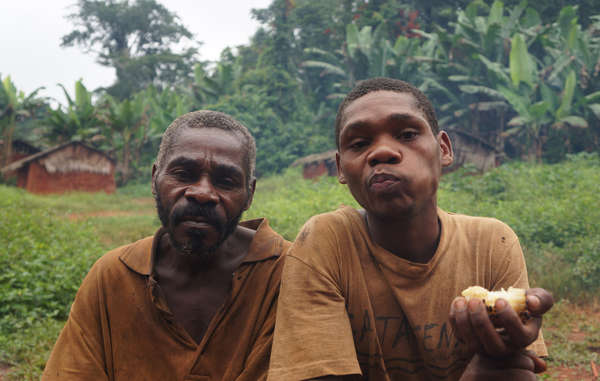
Forced out of the forest, many Baka communities complain of a serious decline in their health. Living on the roadside, they are increasingly exposed to malaria and other diseases.
© Survival International
The international conservation organization has thereby violated both OECD human rights guidelines and its own policy on indigenous peoples, and Survival’s legal team has therefore submitted a formal complaint.
Baka have repeatedly testified to Survival about the activities of these anti-poaching squads in the region. In 2015 one Baka man said: “When they came to beat me here in my home, my wife and I were sleeping. They beat me with machetes. They beat my wife with machetes.”
Survival International is calling for a new approach to conservation that respects tribal peoples’ rights. Tribal peoples have been dependent on and managed their environments for millennia. Despite this, big conservation organizations are partnering with industry and tourism and destroying the best conservationists and guardians of the natural world – tribes. They are the environment’s best allies, and should be at the centre of conservation policy.“They are letting the elephants die out in the forest at the same time as they are stopping us from eating,” another Baka man told Survival. Today, the destruction of Baka land through logging, mining and the trafficking of wildlife continues, provoking concern among tribespeople that their land is being destroyed, even as they are denied access to large parts of it in the name of conservation.
Survival’s Director Stephen Corry said today: “WWF knows that the men its supporters fund for conservation work repeatedly abuse, and even torture, the Baka, whose land has been stolen for conservation zones. It hasn’t stopped them, and it treats criticism as something to be countered with yet more public relations. It calls on companies to stick to the same OECD guidelines it routinely violates itself. Both conservation and development have been allowed to trump human rights for decades and millions of people in Africa and Asia have suffered as a result. It’s time the big conservation organizations got their act together. If WWF really can’t stop the guards it funds in Cameroon from attacking Baka, then perhaps it should be asking itself if it has any right to be there at all.”
Survival International is the global movement for tribal peoples’ rights. We help tribal people defend their lives, protect their lands and determine their own futures. Founded in 1969.
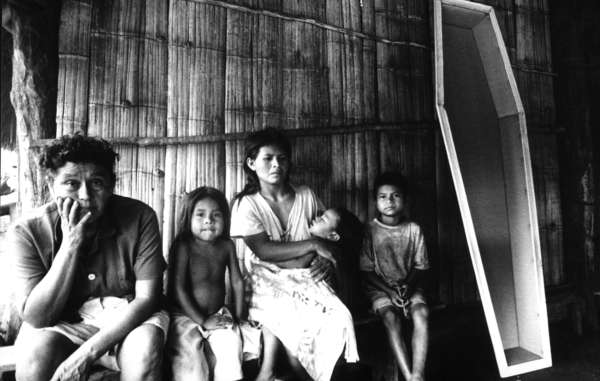
by Deep Green Resistance News Service | Feb 9, 2016 | Alienation & Mental Health, Colonialism & Conquest
Featured image: A bereaved Guarani family waiting beside a coffin. The wave of suicides that has struck the Guarani Indians in the last 20 years is unequalled in South America. Suicide is often seen as the only option by people forced from their land and into a way of life they did not choose. Photo © João Ripper/Survival
By Survival International
A new report published by Survival International reveals that the appalling suicide rate among the indigenous Guarani Kaiowá people of southern Brazil is the highest in the world.
The rate of self-inflicted deaths within the tribe is 34 times the Brazilian national average, and statistically the highest among any society anywhere on earth. Suicide rates among many other indigenous peoples such as Aboriginal Australians and Native Americans in Alaska also remain exceptionally high. This can be viewed as the inevitable result of the historical and continuing theft of their land and of “development” being forced upon them.
The report, “Progress can Kill,” exposes the devastating consequences of loss of land and autonomy on tribal peoples. As well as the shockingly high suicide rates among tribes, it also reveals high rates of alcoholism, obesity, depression and other health problems.
Particularly striking statistics include the sky-rocketing rates of HIV infection in West Papua, which increased from almost no cases in 2000 to over 10,000 by 2015, and the rate of infant mortality among Aboriginal Australians – twice that in wider Australian society. In large parts of the world, poor nutrition continues to cause further problems, such as malnutrition for Guarani children in Brazil, who are forced to live on roadsides, and obesity for many Native Americans, for whom junk food is the only viable option.
Roy Sesana of the Botswana Bushmen, forcibly evicted from their land in 2002, said: “What kind of development is this when the people lead shorter lives than before? They catch HIV/AIDS. Our children are beaten in school and won’t go. Some become prostitutes. We are not allowed to hunt. They fight because they are bored and get drunk. They are starting to commit suicide. We never saw this before. Is this ‘development?’”

Many Aché starved to death after being forced from their forest home in Paraguay
© Don McCullin/Survival
Olimpio, of the Guajajara tribe in the Brazilian Amazon, said: “We are against the type of development the government is proposing. I think some non-Indians’ idea of ‘progress’ is crazy! They come with these aggressive ideas of progress and impose them on us, human beings, especially on indigenous peoples who are the most oppressed of all. For us, this is not progress at all.”
All of these statistics demonstrate the fatal consequences of forcing change on tribal societies in the name of “progress” and “development.” In many cases, tribes have been forced to move away from abundant and sustainable food sources and a sure source of identity in favour of poverty and marginalization on the fringes of mainstream society. Tragic repercussions of such forced change can continue even several generations down the line.
Around the world, tribes continue to fight for the recognition of their right to live on their lands in peace. Where this right has been respected or restored, tribes flourish. For example after the creation of an indigenous reserve in the northern Amazon in 1992, medical teams worked with tribal shamans and together they halved the mortality rate among the Yanomami Indians. Likewise, the Jarawa In India live on their ancestral lands and enjoy what has been called a “life of opulence.” Nutrionists rate their diet as “optimum.”
For more information you can download Survival’s new short report, “Progress can kill,” and a more in-depth paper for those wanting to know more.
Around the world development is robbing tribal people of their land, self-sufficiency and pride and leaving them with nothing. Watch this short, satirical film, written by Oren Ginzburg and narrated by actor and comedian David Mitchell, which tells the story of how tribal peoples are being destroyed in the name of “development.”
Survival International, the global movement for tribal peoples’ rights, is calling for the United Nations to enforce better protection of tribal land rights and to call on governments to uphold their commitments to their indigenous peoples.









